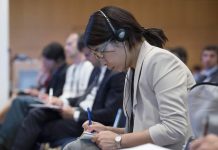
Election coverage is one of the most critical responsibilities of the media. It shapes public discourse, informs voters, and plays a vital role in safeguarding democracy.
However, elections also present unique challenges to editorial independence. External pressures from political parties, advertisers, governments, and even audiences can threaten journalistic integrity. Maintaining independence is not only a professional obligation but essential for public trust.
This article is a combination of opinions shared with Media Helping Media by political journalists.
The importance of editorial independence
Editorial independence means that journalists and editors make decisions based on professional judgement, public interest, and factual reporting, free from influence by political, commercial, or personal interests.
During elections, this independence ensures that coverage is fair, and fact-driven, providing citizens with the information they need to make informed choices.
When the media compromises its independence, it risks becoming a tool for misinformation, polarisation, or partisan agendas—undermining the very democratic processes it seeks to support.
The following advice is compiled from contributions from political journalists in the Media Helping Media network.
1. Adopt and communicate clear editorial guidelines
Media houses should have well-defined editorial policies that emphasise fairness, accuracy, and independence. These guidelines should be publicly accessible to reinforce accountability and transparency.
2. Fact-check relentlessly
Elections are fertile ground for misinformation, propaganda, and manipulated narratives. Newsrooms must invest in robust fact-checking teams to verify claims made by candidates, political parties, and their supporters. Every piece of coverage should prioritise fact over sensationalism or speed.
3. Ensure diverse voices and perspectives
Fair and accurate reporting means giving space to a variety of political opinions, minority voices, and independent experts. Coverage should avoid amplifying only the most powerful or well-funded campaigns, ensuring marginalised groups and emerging political movements are heard.
4. Separate opinion from news
Clear demarcation between factual reporting and opinion pieces is crucial. Readers and viewers should be able to easily distinguish between analysis, editorial opinions, and hard news to avoid conflating bias with objectivity.
5. Resist commercial and political pressures
Advertisers or political interests may attempt to influence coverage, especially during high-stakes elections. Media organisations must be prepared to turn down advertising or sponsorship deals that compromise their editorial decisions. Internal barriers between business and editorial teams are essential.
6. Empower journalists with safety and support
Election coverage can expose reporters to harassment, online abuse, or physical danger. Media houses must prioritise journalists’ safety and mental well-being, ensuring that reporters can work without fear or intimidation, both of which can subtly erode independence.
7. Be transparent about mistakes and biases
If errors occur, acknowledge and correct them publicly. Transparency fosters trust and demonstrates a commitment to accountability. Likewise, openly addressing potential newsroom biases helps audiences understand the efforts made to maintain balance.
The role of media literacy
Finally, media organisations have a role in promoting media literacy during elections. By educating the public about how to identify credible information and question biased sources, the media empowers citizens to resist manipulation, thereby reinforcing the value of editorial independence.
Conclusion
Editorial independence is the backbone of credible election coverage. In a world of increasing political polarisation and misinformation, the media’s ability to report impartially is more important than ever. By adhering to professional standards, resisting external pressures, and focusing on the public good, journalists can ensure their election coverage serves democracy, not politics.
This article is a combination of opinions shared by political journalists in the Media Helping Media network.








